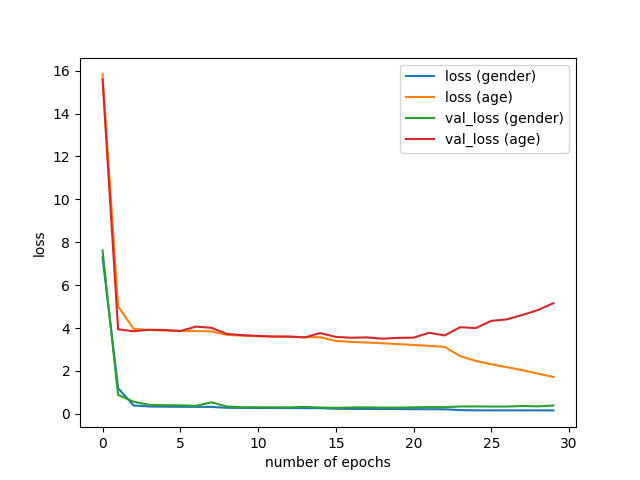Age and Gender Estimation
This is a Keras implementation of a CNN for estimating age and gender from a face image [1, 2]. In training, the IMDB-WIKI dataset is used.
Dependencies
- Python2.7+
- Keras2.0+
- scipy, numpy, Pandas, tqdm, tables, h5py
- OpenCV3
Tested on:
- Ubuntu 16.04, Python 3.5.2, Keras 2.0.3, Tensorflow(-gpu) 1.0.1, CUDA 8.0, cuDNN 5.0
- CPU: i7-7700 3.60GHz, GPU: GeForce GTX1080
Usage
Face detect
''' here use opencv-face-detection. or you can use the mtcnn-caffemodel,
I have packaged the mtcnn face model into a class, the link is here. '''
Use pretrained model
Download pretrained model weights for TensorFlow backend:
The age, gender and emotion pretrained models locate in the directory PRJ_ROOT/trained_models/Run demo script (requires web cam)
python test.pyTrain a model using the IMDB-WIKI dataset
Download the dataset
The dataset is downloaded and extracted to the data directory.
./download.shCreate training data
Filter out noise data and serialize images and labels for training into .mat file.
Please check check_dataset.ipynb for the details of the dataset.
python create_db.py --output data/imdb_db.mat --db imdb --img_size 64usage: create_db.py [-h] --output OUTPUT [--db DB] [--img_size IMG_SIZE] [--min_score MIN_SCORE]
This script cleans-up noisy labels and creates database for training.
optional arguments:
-h, --help show this help message and exit
--output OUTPUT, -o OUTPUT path to output database mat file (default: None)
--db DB dataset; wiki or imdb (default: wiki)
--img_size IMG_SIZE output image size (default: 32)
--min_score MIN_SCORE minimum face_score (default: 1.0)Train network
Train the network using the training data created above.
python train.py --input data/imdb_db.matTrained weight files are stored as checkpoints/weights.*.hdf5 for each epoch if the validation loss becomes minimum over previous epochs.
usage: train.py [-h] --input INPUT [--batch_size BATCH_SIZE]
[--nb_epochs NB_EPOCHS] [--depth DEPTH] [--width WIDTH]
[--validation_split VALIDATION_SPLIT]
This script trains the CNN model for age and gender estimation.
optional arguments:
-h, --help show this help message and exit
--input INPUT, -i INPUT path to input database mat file (default: None)
--batch_size BATCH_SIZE batch size (default: 32)
--nb_epochs NB_EPOCHS number of epochs (default: 30)
--depth DEPTH depth of network (should be 10, 16, 22, 28, ...) (default: 16)
--width WIDTH width of network (default: 8)
--validation_split VALIDATION_SPLIT validation split ratio (default: 0.1)Use the trained network
python demo.pyusage: demo.py [-h] [--weight_file WEIGHT_FILE] [--depth DEPTH] [--width WIDTH]
This script detects faces from web cam input, and estimates age and gender for
the detected faces.
optional arguments:
-h, --help show this help message and exit
--weight_file WEIGHT_FILE path to weight file (e.g. weights.18-4.06.hdf5) (default: None)
--depth DEPTH depth of network (default: 16)
--width WIDTH width of network (default: 8)
Please use the best model among checkpoints/weights.*.hdf5 for WEIGHT_FILE if you use your own trained models.
Plot training curves from history file
python plot_history.py --input models/history_16_8.h5 

Network architecture
In the original paper [1, 2], the pretrained VGG network is adopted. Here the Wide Residual Network (WideResNet) is trained from scratch. I modified the @asmith26's implementation of the WideResNet; two classification layers (for age and gender estimation) are added on the top of the WideResNet.
Note that while age and gender are independently estimated by different two CNNs in [1, 2], in my implementation, they are simultaneously estimated using a single CNN.
Results
Trained on imdb, tested on wiki.

References
[1] R. Rothe, R. Timofte, and L. V. Gool, "DEX: Deep EXpectation of apparent age from a single image," ICCV, 2015.
[2] R. Rothe, R. Timofte, and L. V. Gool, "Deep expectation of real and apparent age from a single image without facial landmarks," IJCV, 2016.